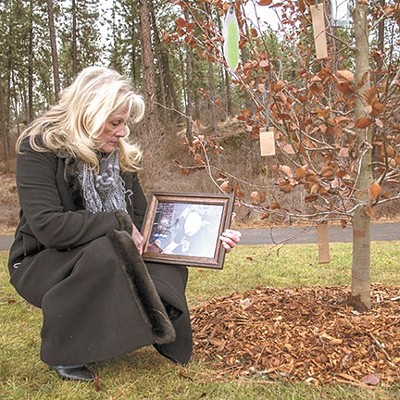
Rhoda Behrens needed someone to arrest her son. Richie had disappeared — refusing mental health treatment and increasingly spiraling out of control — and Behrens turned to the authorities last fall in hopes that someone would find him and bring him back home to Nine Mile Falls.
"I'm not afraid of Richie," she says, "but I know what I'm dealing with."
Behrens, 63, adopted Richie Hoisington as a baby and spent the next 25 years protecting him from himself — caring for him, clothing him, calming his violent tantrums and managing his medications. Behrens rattles off his diagnoses for autism, fetal alcohol syndrome, Tourette's, ADD and compulsive disorders. She walks with a cane after multiple injuries from his outbursts. She warns of his dark delusions.
"If he panics, he's very, very, very dangerous," she says. "He needs around-the-clock care."
Richie does not understand what he's capable of, Behrens says in a tone begging to be taken seriously. He's over 6 feet tall and unpredictable. He has set fires and broken bones. He lies and steals without remorse. His "childlike" mind cannot reliably distinguish fantasy from reality.
Court records, mental health reports and interviews outline a complex and contentious effort to care for a troubled young man with a unique sense of self, but no legal autonomy. His mother has navigated local mental health and justice systems with limited resources, overburdened staffs and conflicting interests. It's a fight she has endured for decades, she says, but in the past year new obstacles have stacked against her.
"I love him," she says in November. "I love him dearly. I feel like I've really failed him. He appears so far out of reach at this moment. I'm so scared that I won't get him before he dies ... or hurts somebody."
At that time in November, with Richie missing and his fate unknown, Behrens seemed at her most desperate. Soon, though — after new criminal charges, mental evaluations and guardian disputes — she would learn there's more than one way to lose someone.
Behrens seems to always carry with her several stacks of court records. She has them all labeled and arranged, with reports stapled together, all highlighted extensively, her notations scribbled in the margins. She spreads these files out on the table and launches into the middle of Richie's story, parachuting listeners into a complicated history.
"This is a case where the system has let him down," she says. "I am just amazed at how numb everyone seems to be, and this just complete disregard for people like Richie. ... It's shocking."
Behrens, a longtime foster parent with a degree in developmental psychology, first took Richie into her home when he was 20 months old. He had previously bounced around five homes in five months, Behrens says. She formally adopted him at age 4. He first went by "Bud," but later took on his adoptive father's name, Richard Hoisington.
Richie grew up alongside many other special-needs foster children and adoptive children at Behrens' 3-acre home in Nine Mile Falls. There, she says, the family also keeps dozens of animals in a 501(c) sanctuary, including dogs, cats, horses and some rescued wildlife.
Court and medical records indicate that Richie has always suffered from an overwhelming combination of disorders that have affected his sensory perception, spatial awareness, moral recognition, impulse control and other factors that make him very difficult to manage. He has assaulted multiple caretakers and requires supervision overnight.
Behrens acknowledges that at one time she used a 6-foot steel mesh cage as a "safe room" to help Richie calm down. After Child Protective Services ordered Behrens to dismantle the cage, Richie ended up attacking her in 2000, causing a traumatic brain injury. She sued the state over the incident, but a jury rejected the claim.
A separate federal settlement in 2004 resulted in additional caretakers to help supervise Richie around the clock. When Richie turned 18 in 2006, he wholeheartedly agreed to his mother being named guardian. Behrens says Richie made great progress until medication issues arose in the past couple of years, leading to renewed aggression and volatility.
"He became more and more unmanageable, more and more angry," she says. "So many things have happened since."
Richie's care has taken a toll — physically, emotionally and financially, Behrens admits. The family has long employed live-in caretakers for Richie and her other autistic son, Joe. Behrens and the caretakers often slept in shifts to watch Richie at night. Richie could be abusive, sometimes attacking people or destroying property. Behrens says she has gone from financially comfortable to hundreds of thousands of dollars in debt.
Behrens has also undergone physical therapy multiple times to recuperate after attacks. She now sees a psychiatrist regularly to cope with the overwhelming nature of Richie's needs. She says she takes medication for anxiety and depression. But she believes she's doing what she has to for her son.
"I want him to live a long life," she says, "as happy a life as possible."
Behrens has worked with Kim Chupurdia, a psychologist at Columbia Medical Associates, for many years. In the past several months, Chupurdia has written more than a dozen letters to various legal and mental health officials supporting Behrens' efforts to arrange treatment and new medications for Richie.
"His medications have at times kept him less aggressive," Chupurdia writes, "but he has always had break-through symptoms of delusional and paranoid thinking. Ms. Behrens has an excellent understanding of behavioral principles. ... However, she has not had enough support in the home to keep these behavioral programs consistent."
Mental health providers report that Richie started refusing services last year. He would carry around his prescriptions, but not take them. Providers could not force him to take the medication.
It's a common problem, says Ron Anderson, president of the Spokane chapter of the National Alliance on Mental Illness. Many families run into barriers when trying to get a loved one to take meds. While many advocates have called for easing treatment limitations, involuntary medication still requires a court order.
"You can't just force anybody," he says. "You have to wait until the bottom drops out."
Richie started his descent early last year. As his temper turned violent, he became harder to control, Behrens says. In April 2013, a psychotic episode resulted in two assault charges; records indicate he spent the next two months in the Stevens County Jail. Behrens says authorities did not notify her or any other mental health providers when Richie was released in late June, so he was let out on the street. He ended up staying with a stranger in Tonasket, described in court records as a former reserve deputy.
Behrens explains this is when things started slipping out of control. She says she convinced authorities to transport Richie back to Spokane, but she felt she couldn't allow him to stay with her until he got his medication stabilized. She had him taken into the House of Charity, but his erratic behavior continued to escalate.
Court records show police cited him for running into traffic on Aug. 1. Officers arrested him for theft on Aug. 21, and again on Aug. 31, when he stole a tip jar from a pizza stand and fought with bystanders. He then racked up two felony charges on Sept. 12, when surveillance video caught him breaking into the Sport Town store, smashing a $5,000 window and making off with a photo and sports bags. After each arrest, he was released within a day or two.
Behrens believed this streak might serve as the leverage to get Richie into a new treatment program. She pleaded with local judges to detain him for a mental health evaluation. Her request worked, as Richie was held and later transferred to Eastern State Hospital — but it also sparked an inquiry into her abilities as guardian.
In November, Commissioner Rachelle Anderson, the Superior Court's authority over guardian matters, gave Safe Haven Guardianship Services control of Richie's estate and finances (which Behrens did not object to). Anderson also assigned a court representative, called a guardian ad litem, to investigate Richie's recent spiral.
"It appeared his mother, the guardian of the person, had no real handle on where Mr. Hoisington was," she writes, "and that is far from ideal in any given guardian ... situation, and quite alarming in this particular case."
Court records indicate Richie transferred to Eastern State on Feb. 10. He was initially kept in isolation and only later allowed into a secured unit; his behavior has fluctuated wildly. Guardian ad Litem James Woodard met with Richie and hospital staff in March, records show, after his temperament had calmed.
"He was oriented, articulate and outgoing," Woodard reports.
Mental health professionals offered a variety of conflicting views on his status. Some found him competent and amiable, while others considered him threatening. One staff member reports Richie first seemed fairly sharp and cooperative, but she later came to believe he was "covering" his issues through a convincing performance.
Eastern State officials declined a request from the Inlander to visit Richie, saying privacy law prevented them from even confirming his presence.
Woodard later reported Richie expressed a strong animosity toward his mother. He no longer wanted a guardian of any kind. Behrens says she has not been allowed to visit Richie since August, arguing he likely feels abandoned.
Behrens contends Woodard's guardian report misrepresented many issues, calling it "character assassination," alleging he deliberately slanted testimony against her. She argues that Safe Haven wants full guardianship, but will not have the time or resources to monitor Richie as closely as she can. No one else will put in the effort she has to make sure he's safe.
"If they could get me out of the picture," she says, "Richie will no longer be protected."
Josh Guthmueller, a full-time guardian with Safe Haven, says the agency has no concerns whatsoever about its ability to manage and monitor someone like Richie. They serve many severely incapacitated individuals.
"We are a professional guardian," he says. "That's what we do. ... We have some difficult clients."
Richie started acting out again in April, according to the latest report available. His behavior was decompensating.
"He is isolating himself, not making eye contact, laughing to himself and drawing swastikas on his arms," the report states. "[These] are either signs of psychosis or a response to stress. ... He still does not want to see his mother."
Leaning lightly into her cane, Behrens steps before the court on June 5, almost a year after Richie's release from Stevens County set both their lives spiraling. She pulls court records and file folders from her bag, spreading them over the table in front of her. Woodard, in a gray blazer, sits across the aisle as Commissioner Anderson takes up the case.
Woodard stands to present a summary of his findings. He says Richie is a "difficult one to calibrate," noting the many conflicting reports and his unpredictable shifting from positive to negative temperaments.
"He's being somewhat uncooperative with treatment," Woodard says.
But the guardian ad litem notes he has found only one real consistency with Richie.
"He doesn't want his mother to be his guardian," Woodard says. "Ms. Behrens really micromanages him and that's probably to his detriment. ... My recommendation is to remove her as guardian."
As Woodard sits, Anderson thanks him for the report and turns to Behrens, noting she has filed a "very lengthy bit of information." Behrens explains much of the material involves sworn statements contradicting the guardian report. She holds up several statements, arguing Woodard's report was incomplete and deliberately biased against her.
"I am not trying to micromanage my son," she argues. "What I am trying to do is keep him safe."
As Behrens continues to criticize the report, Anderson interjects, noting the report confirms many of the concerns the court expressed last fall when Behrens did not know where Richie was. Anderson says the guardian must "have a handle" on the individual and monitor his well-being.
"You will always be his mother," Anderson then says. "You will always be an advocate for him, involved in his life. But as the guardian of his person, that is a much different role than as his parent, and it appears that, based on ... Mr. Woodard's investigation, my initial concerns seem to be verified. You are not an appropriate person to act as Richie's guardian from here forward."
Behrens starts to object, but Anderson stops her. Behrens sits motionless, her hands flat on the table, but Richie's father rises in protest.
"I feel you're being blinded," he says quietly. "I'm sorry, your honor."
Anderson reminds them she has her own responsibilities to protect Richie. She then orders the removal of Behrens as guardian of Richie's person, effective immediately, and names Safe Haven as his new guardian. If Behrens wishes to contact Safe Haven, the order says she must do so in writing. Behrens says she plans to appeal.
"You may do so," Anderson says. "I'm sure you know that process."
"Yes," Behrens responds, "I do."
In the hallway outside the courtroom, Behrens shakes her head. Her desperate push to get Richie into a new treatment program may have come at the cost of her relationship with him. All his personal decisions will now go through Safe Haven. She does not have to be notified of his status. She may not be able to visit him.
"My son has been effectively kidnapped," she says.
Behrens still holds hope that Richie will be allowed the freedom to live a meaningful life. She dreams of his returning to work with her animals, a job he always enjoyed. She has filed an appeal for a revision of the court's decision. She plans to fight to stay a part of his care. She feels betrayed by the system.
"No parent should have to go through so much to get their child the help they need," she says. "If they've done this to me, they've obviously done this to others. ... They've done everything they can to keep Richie and I apart."
When Richie was a baby, no one would take him, she says. Everyone gave up on him, but not her. She doesn't plan to start now. The next hearing is set for early July.
"I am totally devoted to Richie," she says. "I would give my life for him." ♦





















